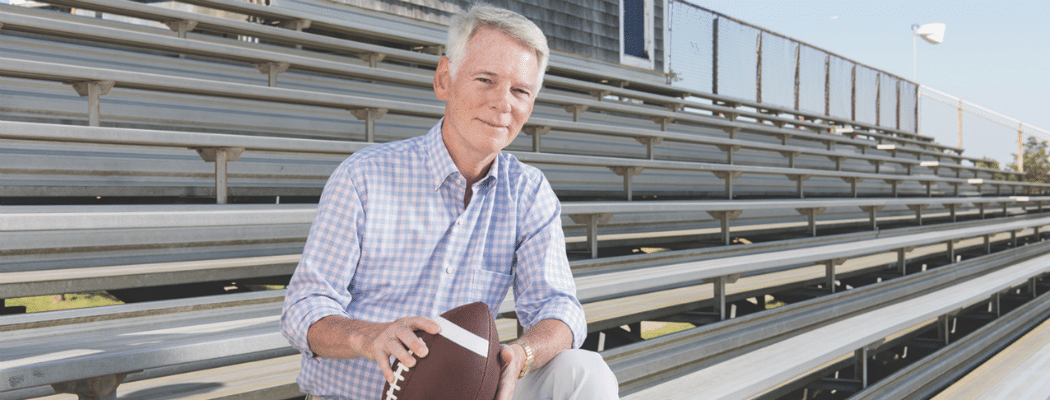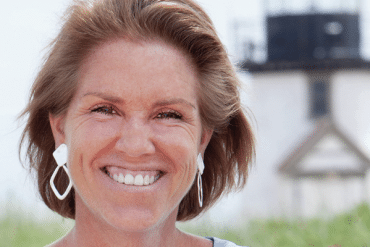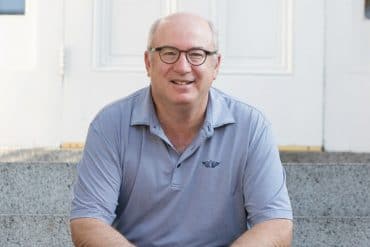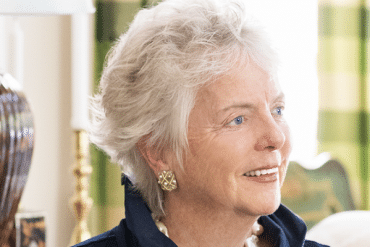Taking score with CBS Sports Chairman Sean McManus.
When it comes to television icons, Sean McManus has achieved his own unique kind of fame. Hidden from the public eye, McManus has literally pulled the levers behind the biggest sports broadcasts on the planet. Today, he is one of the most highly respected television executives in the country. His career is dotted with Hall of Fame accolades, from being named the youngest vice president in the history of NBC at the age of twenty-seven, to being the only person to ever serve as president of both CBS News and CBS Sports concurrently. Now the chairman of CBS Sports, McManus continues to redefine television. In many ways, it’s a calling that began long before he was legally old enough to punch a time card.
 McManus’ first job in television came at the age of twelve working in a production truck parked at the Jacksonville Open Golf Tournament. Emptying ashtrays and fetching sodas and coffee for the technicians pulling the levers behind the telecast, McManus felt an almost molecular pull toward the excitement of producing live television. In fact, he had sports broadcasting in his blood. His father, Jim McKay, was the legendary host of ABC’s Wide World of Sports, and McManus spent much of his childhood attending sporting events around the globe. “In those days, Wide World of Sports covered the entire breadth of the sports world, everything from the major sporting events to the lesser-known events,” McManus said. So some weeks, he’d attend the U.S. Open or the Indianapolis 500, and others, he’d be watching dog sled races, synchronized swimming competitions, barrel jumping contests and water skiing championships. “So I feel I have a great appreciation for sports not just at the highest levels, but in all levels in the area of competition.”
McManus’ first job in television came at the age of twelve working in a production truck parked at the Jacksonville Open Golf Tournament. Emptying ashtrays and fetching sodas and coffee for the technicians pulling the levers behind the telecast, McManus felt an almost molecular pull toward the excitement of producing live television. In fact, he had sports broadcasting in his blood. His father, Jim McKay, was the legendary host of ABC’s Wide World of Sports, and McManus spent much of his childhood attending sporting events around the globe. “In those days, Wide World of Sports covered the entire breadth of the sports world, everything from the major sporting events to the lesser-known events,” McManus said. So some weeks, he’d attend the U.S. Open or the Indianapolis 500, and others, he’d be watching dog sled races, synchronized swimming competitions, barrel jumping contests and water skiing championships. “So I feel I have a great appreciation for sports not just at the highest levels, but in all levels in the area of competition.”
Then came the 1972 Olympics in Munich. McManus joined his father, who was covering gymnastics and track and field events for ABC Sports. On his only day off, McKay was swimming in the hotel pool when a call came in commanding him directly to the studio. He pulled his trousers over his swim trunks, grabbed his son and headed for the ABC compound. Unbeknownst to McKay, the Israeli team had been taken hostage in the Olympic village. “My dad got into the anchor chair and didn’t leave till about eighteen hours later,” McManus remembered. “I was with him during that entire period. He was the only conduit that the outside world had to this terrible tragedy.” As McManus watched his father report the news all the way to its terrible conclusion, he saw another side of him—not just the sports broadcaster, but the journalist.
 “My dad always believed in storytelling, reporting and writing,” McManus reflected. “He was a sports broadcaster but he could have just as easily been an anchor or news reporter. So he instilled in me a true appreciation of storytelling, writing and reporting, so that when I got the job at CBS News, I really feel that in my bones and in my character, this tradition that my father instilled in me, the skills that he instilled in me and the lessons that I watched him perform served me very well.”
“My dad always believed in storytelling, reporting and writing,” McManus reflected. “He was a sports broadcaster but he could have just as easily been an anchor or news reporter. So he instilled in me a true appreciation of storytelling, writing and reporting, so that when I got the job at CBS News, I really feel that in my bones and in my character, this tradition that my father instilled in me, the skills that he instilled in me and the lessons that I watched him perform served me very well.”
Growing up, McManus used to do the play-by-play of Yankees and Giants games into a handheld tape recorder, practicing the skills he observed in his father. “But when I got into my teens, I realized that it would be very hard to follow in his footsteps,” McManus reflected. “He cast an awfully big shadow.” Instead, he decided that he was better qualified to be behind the camera. He remembered the thrill he felt inside the production truck for the first time. McManus worked as a “gofer” at ABC during college, running errands and taking a firm grip on the bottom rung of the production ladder. After graduating cum laude from Duke, he got an entry level job as a production assistant at ABC Sports.
 However, after two years, McManus realized that working for the same network as his father presented unique advantages and disadvantages. Some people made his life easier, while others made it harder. He wanted to earn his way on his own merit, so one day he invited his father to lunch and told him that he was considering leaving ABC for another network. His father not only supported the decision, but instructed him to go to a payphone in the restaurant and call up one of his old colleagues at NBC.
However, after two years, McManus realized that working for the same network as his father presented unique advantages and disadvantages. Some people made his life easier, while others made it harder. He wanted to earn his way on his own merit, so one day he invited his father to lunch and told him that he was considering leaving ABC for another network. His father not only supported the decision, but instructed him to go to a payphone in the restaurant and call up one of his old colleagues at NBC.
Sure enough, McManus was offered an entry level job as an associate producer at NBC Sports where he was assigned to everything from the Tour de France to the NFL. Within six years, he was made vice president of programming and planning at NBC Sports. “For whatever reason, my bosses had faith that I could do it, and I was thrown into the upper echelons of management,” McManus said. “I was really scared and I had a great deal of anxiety, but I realized that if I worked as hard as I could, and studied as much as I could, and prepared as much as I could that I could succeed in this role.”
Young and single, McManus was married to NBC Sports. He was the first in the office and the last to leave. He not only mastered the programming of NBC, but he became an expert in what his competitors were doing over at ABC and CBS. Like a journalist trying to break a story first, McManus worked intensely to get the rights to broadcast headlining sporting events. During his five years as vice president, McManus successfully negotiated the rights to the Olympics, the NFL, Wimbledon, the Orange Bowl, NCAA college basketball and auto racing. “They were some of the most fulfilling years of my career,” McManus said.
 In the mid-nineties, McManus moved networks yet again, taking the position of president of CBS Sports. At the time, he had already left NBC Sports and had been running the television division of the sports marketing behemoth International Management Group. Exiting a restaurant one night in the fall of 1996 in Manhattan, McManus bumped into Peter Lund, who ran CBS at the time, and got to talking about the sports business. Two weeks later, Lund invited him to breakfast and offered him the job to run CBS Sports. McManus took the position before even asking what his salary would be. When Lund questioned him on that, McManus said that he wasn’t taking the job for the money; he was taking it for the opportunity. “I saw a great chance to return CBS to its glory days,” McManus said.
In the mid-nineties, McManus moved networks yet again, taking the position of president of CBS Sports. At the time, he had already left NBC Sports and had been running the television division of the sports marketing behemoth International Management Group. Exiting a restaurant one night in the fall of 1996 in Manhattan, McManus bumped into Peter Lund, who ran CBS at the time, and got to talking about the sports business. Two weeks later, Lund invited him to breakfast and offered him the job to run CBS Sports. McManus took the position before even asking what his salary would be. When Lund questioned him on that, McManus said that he wasn’t taking the job for the money; he was taking it for the opportunity. “I saw a great chance to return CBS to its glory days,” McManus said.
And that’s exactly what he did. McManus led the charge to reclaiming the rights to the NFL, which CBS had lost to Fox in the early nineties. “The biggest accomplishment that I’d ever been lucky enough to be a part of was when we brought the NFL back in 1998,” he said. “That really put CBS Sports back on equal footing with the other sports divisions and indeed made the CBS corporation and television network itself really viable again.” The network locked in the NFL until 2022 and went on to produce seven Super Bowls, the most recent of which came last February with the New England Patriots’ victory over the Los Angeles Rams.
 McManus proved so effective in running CBS Sports that in 2005 he was made president over CBS News as well. For five years, McManus’ days consisted of sprinting from one studio to another, helming the production of both newscasts and sports broadcasts. His eye for talent, developed from watching his father for so many
years, yielded such successful hires as Katie
Couric at CBS News
and more recently Tony Romo for CBS Sports.
McManus proved so effective in running CBS Sports that in 2005 he was made president over CBS News as well. For five years, McManus’ days consisted of sprinting from one studio to another, helming the production of both newscasts and sports broadcasts. His eye for talent, developed from watching his father for so many
years, yielded such successful hires as Katie
Couric at CBS News
and more recently Tony Romo for CBS Sports.
McManus’ skills were put to the ultimate test during CBS Sports’ 2013 broadcast of Super Bowl XLVII when the power suddenly went out early in the third quarter. From their headquarters, McManus quarterbacked his production team, communicating to cameramen and on-air talent through cellphones, and effectively changing their roles from sports broadcasters to investigative journalists. When the power finally came flickering back nearly forty minutes later, McManus resumed his post overseeing the live coverage of the game. “The Blackout Bowl,” as it became known, was just another exhilarating episode in a television career that spans four decades.
 Today, McManus continues to serve as chairman of CBS Sports. Though his title might be higher up the ladder, McManus still finds himself wedged inside the production truck watching over producers’ shoulders like he did back when he was twelve years old. The thrill of producing live television is as captivating to him today as it was back then. And though his father Jim McKay passed away a little over a decade ago, Sean McManus still remembers all the lessons he learned from him: “My father was universally respected for his integrity as well as his talent. He used to say that ‘The camera can spot a phony every time. That’s true in television and in life.’ I have tried to live my life with those words in mind.”
Today, McManus continues to serve as chairman of CBS Sports. Though his title might be higher up the ladder, McManus still finds himself wedged inside the production truck watching over producers’ shoulders like he did back when he was twelve years old. The thrill of producing live television is as captivating to him today as it was back then. And though his father Jim McKay passed away a little over a decade ago, Sean McManus still remembers all the lessons he learned from him: “My father was universally respected for his integrity as well as his talent. He used to say that ‘The camera can spot a phony every time. That’s true in television and in life.’ I have tried to live my life with those words in mind.”







